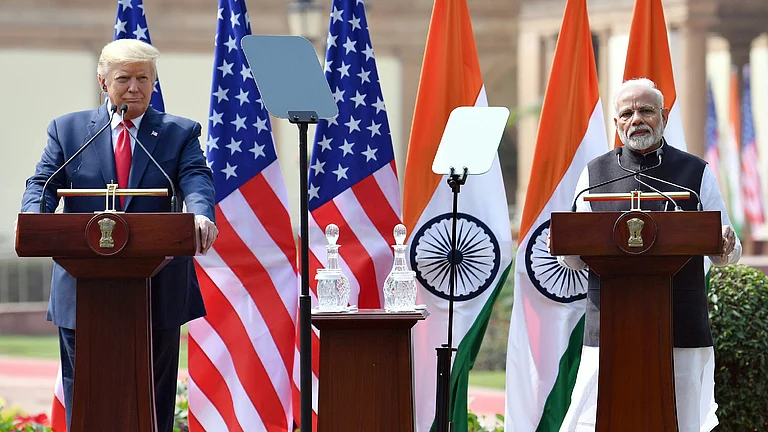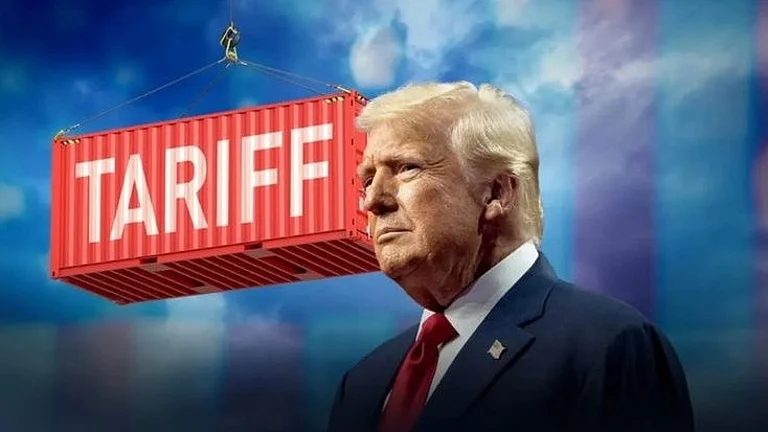Agriculture has taken a centre stage of an escalating trade war with US President Donald Trump’s reciprocal tariff plan which is expected to be rolled out on April 2 at 4 pm (Eastern time) or 1.30 am IST.
Just a few hours before President Trump’s announcements, the White House stated that India imposes a 100% tariff on American agricultural products.
It said that the high tariffs imposed by other countries made it "virtually impossible” for US products to be imported into those nations.
Agricultural Self-Sufficiency
The US wishes to claim a greater hold on the India’s farm sector as it considers it a major untapped market. However, India has remained protective of its resources citing food security, livelihoods and interests of small farmers. India’s strong resolve has helped it transform from a food-deficient nation in 1950s to a food-surplus unit through agricultural breakthroughs like the green revolution and white revolution. The transition helped India become self-sufficient in staples, and became the world's largest milk producer. Rapid growth in horticulture, poultry and aquaculture expanded its food basket. While India has managed to become self-sufficient, there are concerns that increasing foreign influence could jeopardise these advancements.
Challenges in Indian Agriculture
Despite its feat, Indian agriculture still does not have a strong hold on productivity, infrastructure and market access. What makes bridging this gap more challenging are the global price volatility and climate change. According to BBC, crop yields are much lower than the global best. The report further stated that small landholdings add to the problem, as Indian farmers work with less than a hectare on average, while their American counterparts worked with over 46 hectares in 2020.
If we talk about current exports, India exported $5.7 billion worth agricultural products to US in 2024, representing 11% of the total agricultural exports. In contrast, the US average applied Most Favored Nation (MFN) tariff on agricultural goods is 5%. But India’s average applied MFN tariff is 39%, revealed a White House press release.
Trade Imbalance and Tariffs
According to The Hindu, while responding to questions in the Oval Office on March 31 about the unfair tariffs faced by the United States, the US President Trump said, “I think a lot of [countries] will drop their tariffs because they’ve been unfairly tariffing the United States for years. If you look at the European Union on cars, the European Union already dropped their tariff to 2.5%. It was announced a couple of days ago. A very small tariff. The United States charged very little."
On March 31, the US Trade Representative (USTR) released the 2025 National Trade Estimate (NTE) Report. The report stated that India maintains high applied tarrifs on vegetable oils (as high as 45%), apples, corn and motorcycles (50%), automobiles and flowers (60%), natural rubber (70%), coffee, raisins and walnuts (100%) and alcoholic beverages (150%). In addition, it stated, "High tariff rates also present a significant barrier to trade in other agricultural goods and processed foods (like poultry, potatoes, citrus, almonds, pecans, apples, grapes, canned peaches, chocolate, cookies, frozen french fries and other prepared foods used in fast-food restaurants)."
India's World Trade Organisation (WTO) bound tariff rates on agricultural products are among the "highest" in the world, averaging 113.1% and ranging as high as 300%, reported ET.
Facing pressure from farmers’ groups over the US and Indian trade negotiations taking place in Delhi on March 29 , External Affairs Minister S. Jaishankar acknowledged their concerns but emphasised that negotiators should be “trusted” to negotiate the “best possible deal” for India, reported The Hindu.
If India gives in to US pressure at this juncture, experts warn, it risks compromising millions of livelihoods, undermining food security and flooding local markets with cheap imports—something that could leave a lasting impact, which could take generations to undo.


































